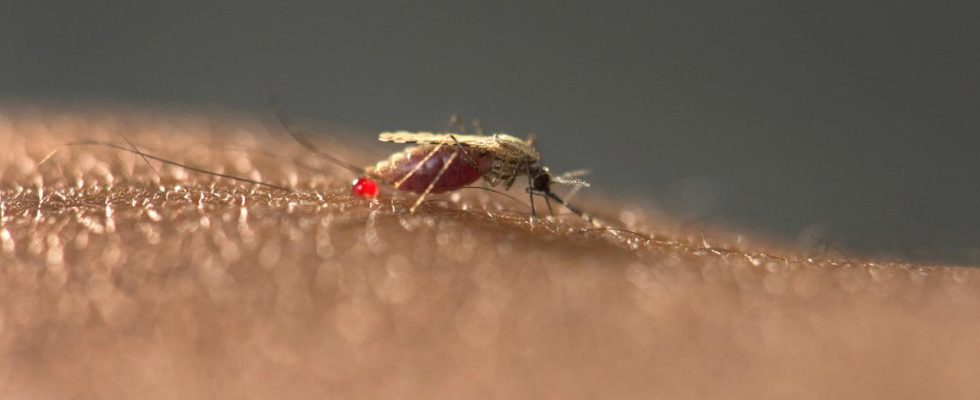background
It is estimated that up to 300 million people worldwide become infected with malaria every year. More than 600,000 of those affected die from the disease every year. Most of them are children.
Since the beginning of the millennium, the number of malaria infections and malaria-related deaths has been almost halved. Through mosquito control, bed nets, the use of insecticides and, in recent years, vaccinations. A measure alone against the malaria pathogen is not enough because, from a biological point of view, this parasite, which belongs to the genus Plasmodium, is much more complex than, for example, a virus.
While a virus has only a few functions, a parasite is “as complex as a human cell,” explains immunologist Thomas Jacobs from the Bernhard Nocht Institute for Tropical Medicine in Hamburg. “Not only does the parasite have four or five proteins like a virus, but the malaria parasite has 5,000 proteins.”
Difficult to combat pathogen
The malaria parasite is therefore particularly flexible and difficult for the immune system to combat. Because once it has entered the human organism through the blood-sucking of a female mosquito, it goes through various stages of development. First it goes “into the liver and stays there for about five days,” says immunologist Jacobs. “And our immune system actually always needs seven to eight days until it is running at full speed, until it has learned that there is something foreign there, then the immune response is made. Only then is the parasite gone again.”
The parasite continues to change afterwards, so that the immune system can hardly recognize it. This is the central challenge for drug and vaccine development, because no one drug can work against the parasite at all stages of development in the human body.
Increase in new infections and malaria deaths
After years of decline, the World Health Organization (WHO) reported an increase in new infections for the first time in 2020, in the first year of the corona pandemic, and even a significant increase in malaria deaths of ten percent, explains infectious disease epidemiologist Jürgen May, who heads the Bernhard Nocht Institute for Tropical Medicine in Hamburg. Both drug prophylaxis and the distribution of “bed nets were not as intensive as before” and other measures, such as the elimination of mosquito breeding grounds, were neglected by the protection rules during the corona pandemic.
In addition, vaccination, prevention and education programs were canceled in order to avoid infection with SARS-CoV-2 in large groups of people. In 2021, malaria cases recorded by the WHO stagnated at the 2020 level, but in 2022 they increased again. Before the pandemic, around 576,000 people died from the dangerous Malaria Tropica variant, which is particularly widespread in southern Africa, but in 2022 the figure was 608,000 people. Most of them are children younger than five years old.
Fighting malaria is like a marathon
The experts and scientists agree that combating this dangerous infectious disease requires a particularly long stamina. Timothy Wells, scientific director of the non-governmental organization Medicines for Malaria Venture in Geneva, emphasizes that there should be no pauses in the fight against malaria.
“We’re only halfway there to eradicate malaria. We don’t have enough medicines and vaccines yet. And we’ll probably never get there, but we have to try.” Achieving improvements takes years, he says, but as soon as measures fail or are suspended, the mosquitoes spread again and with them malaria.
First resistances
There is also another difficulty. There are initial signs that the malaria parasite is becoming resistant. Namely against the active ingredient artemisinin, which has been the heart of all drug therapies to date. Tobias Spielmann, cell biology at the Bernhard Nocht Institute, found evidence of this with his team in Africa. On the one hand, the pathogen has changed and on the other hand, “the first signs have appeared that not all people can be treated so well anymore.” Resistance has not yet been observed across the board in Africa, but it is causing experts great concern.
Impact of climate change
And another problem is emerging: a new malaria mosquito species (Anopheles Stephensi), which was previously primarily native to Southeast Asia, is spreading across the African continent. The reason for this is probably climate change: temperatures are changing, as is humidity and precipitation, so researchers are already observing that these mosquitoes are spreading in regions that were previously spared from malaria.
This mosquito species is more heat-resistant and tolerates drought better than the species native to Africa and can also survive in cities that have previously been hardly affected by malaria. If this type of mosquito actually settles there across the board, then it is to be feared that malaria infections will continue to spread, according to the World Health Organization (WHO).

